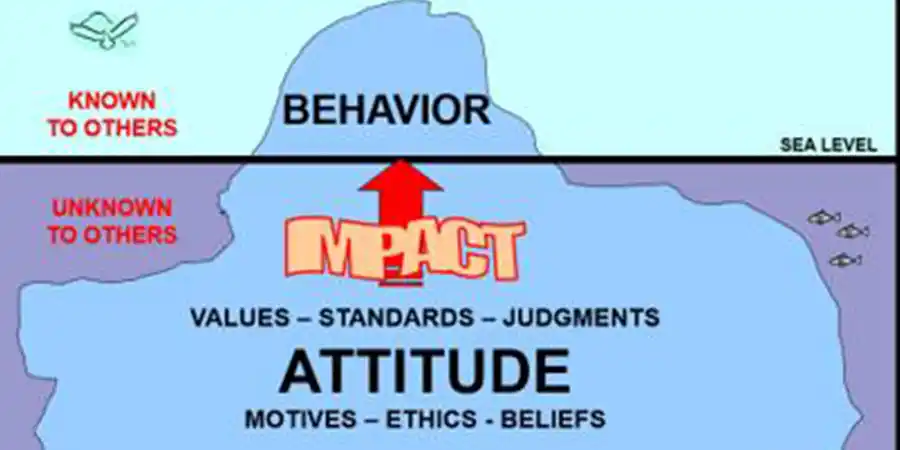To be successful in life, whichever the field or profession he or she chooses ultimately the end point expected is “Success”. What is required to be successful is a big question mark. Many people are having an impression that Skills, knowledge and hard work or any one of the three attributes is adequate to be successful. If a person is just having skills he may be successful to an extent of eighty two percent, full of knowledge ninety six percent and finally hard work ninety eight percent. One attribute which makes hundred percent successful is Attitude. “Attitude is everything”.

If anyone sees an Iceberg, we just see ten percent of the Iceberg is visible but ninety percent of it remains hidden deep in the ocean as shown in the figure above. Similarly, when we see others it is just ten percent of their behaviour known to us, remaining ninety percent which is unknown are their values, standards, ethics, judgments and motives. These attributes impact the behaviour of a person which is nothing but their attitude. So “Attitude is everything”.
To get a positive result, seed a positive thought in the mind. A person with a positive attitude attracts positive results like a magnet. Our life is a reflection of our attitudes. A positive thinker sees the invisible, fields the intangible and achieves the impossible. The difference between a successful person and others is not the lack of knowledge, but rather the lack of will, again it is the attitude of that person.
The Egypt and India are more than 2000 years old but are developing countries. In the case of countries like Australia, Canada and New Zealand that are 150 years ago were inexpressive, today they are well developed and rich countries. This shows the development of a country is nothing to do with the age. The difference between a rich and a developing country does not depend on their available natural resources also. For example, Japan has a limited territory and resources, eighty percent of which covers mountains not conducive for agriculture it is surprisingly the second largest economy in the entire world. Japan is importing raw materials from other parts of the world and exports the best goods in the world. One more classic case is is Switzerland, it produces the best chocolate in the world and Switzerland also famous for all dairy products of the best quality, surprisingly many of us doesn’t know that this country doesn’t have cocoa seeds. Though Switzerland is a small country changed its image having a World’s Strong Safe, and maintaining an image of best security, law & order in the country.
Just observing the nature and behaviour of the people living in developed as well as rich countries, most of the citizens follow these principles in their lives- Ethics, integrity, responsibility, respect to the laws and rules, respect to the rights of other citizens, work loving, strive for saving and investment and punctuality.
The so called developing countries like India, Brazil, Mexico and few of our neighbouring nations only a small percentage of their citizens follow the most basic principles in their daily life. When administrators, policy makers or even executives from developed nations meet or interact with the developing countries, the intellectual disparities are minimal and also the physical appearance is not the main distinguishing factor. What is the difference then? The key distinction is the attitude cultivated over the years through education and cultural influences but not at all to blame the nature or the resources that they have. Our own country India, for example, it’s still labelled a “developing nation” not due to resource scarcity to be specific India today largest supplier of human resources to entire world many Indians excelled in other developed nations and have become global leaders. The missing ingredient here is the will to act and comply. Therefore, attitude becomes the critical factor in achieving success. We lack the ‘Will to comply with’. Hence “Attitude is the mantra for Success.”
–
Dr. T. Sridhar, ACED
